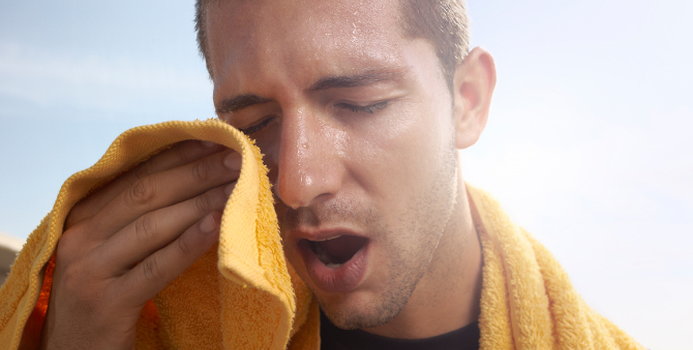Dehydration and sweating have a lot to do with one another. In order to prevent your body from dehydrating, you need to make sure that you take in plenty of water. But as a result of taking in plenty of water, you also may experience more sweating than usual. On average, your body sweats out about 10 percent of the water that it loses everyday. Even if you do not exercise regularly, your body will continue to sweat at various times during the day to make sure that you get the benefits of sweating. It can help keep your skin active, clean out your pores, help you keep your body temperature down and even prevent you from getting sick by removing toxins from your body. Sweating can have a relationship with dehydration if you're not careful, though.
How Dehydration Affects SweatingYour body needs to sweat regularly in order for you to remain healthy. And in order to sweat, it needs water. Sweat is made up of about 95 percent water. However, if you do not take enough water in and dehydrate yourself, there's a good chance that you can face a few adverse affects. If you are out in the heat or working out, your body needs to sweat in order to prevent itself from overheating. To sweat, of course, you need to be hydrated. But if you are dehydrated, your body will not be able to sweat and you will be putting yourself at risk for heat stroke or heat exhaustion. Both of these can cause you to feel weak and may even cause you to faint. Therefore, staying hydrated directly affects your sweating which also determines the ability of your body to cool itself.
Hydrating ProperlyIn order to avoid suffering because your body is not able to produce sweat, it's important that you stay hydrated before, during and after a workout. About two to three hours before working out, you should begin drinking water to prepare yourself for exercise. This water will be used later to produce sweat during your workout and decrease your body's internal temperature. Once you begin exercising, you should take in about 10 ounces of cold water for every 10 to 15 minutes of exercise that you do. This will help you continue to produce sweat throughout your entire exercise routine. And after you exercise, you should keep drinking water to allow your body to rehydrate itself after sweating out a good portion of your water supply.
The act of sweating is tied very closely to your body's hydration. You need to replace any water that you sweat out to prevent your body from getting dehydrated. If it does, you will likely have a body temperature that becomes dangerously high. As a result, you could be putting your body at risk of breaking down or failing in its normal functions. Stay hydrated to make sure that you are able to sweat during the day as needed. And if you find that you are staying hydrated but you're still having problems, consult your doctor to find out if you could have a more serious problem.



